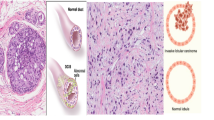Abstract
Machine learning has opened a new era of effective and easy ways of data analysis in biological research. The use of high throughput data analysis tools and libraries facilitated cancer research among many other benefits. Breast cancer is one of the main reasons for mortality among women. Apart from traditional molecular detection, it is also necessary to find an alternate approach. With the advent of modern technology, clinicians and healthcare providers can improve diagnosis accuracy and detection. In this study, we use a simple layer-based deep learning approach to investigate the malignancy of breast cancer. Our finding includes shows over 97% accuracy with the ANN-based machine learning approach.
Access this chapter
Tax calculation will be finalised at checkout
Purchases are for personal use only
Similar content being viewed by others
References
De Silva, S., et al.: fMRI feature extraction model for ADHD classification using convolutional neural network. Int. J. E-Health Med. Commun. (IJEHMC) 12(1), 81–105 (2021)
Rubasinghe, I., Meedeniya, D.: Ultrasound nerve segmentation using deep probabilistic programming. J. ICT Res. Appl. 13(3), 241–256 (2019)
Haputhanthri, D., et al.: Integration of facial thermography in EEG-based classification of ASD. Int. J. Autom. Comput. 17(6), 837–854 (2020)
Sung, H., et al., Global cancer statistics 2020: GLOBOCAN estimates of incidence and mortality worldwide for 36 cancers in 185 countries. CA: Cancer J. Clinic 71(3), p. 209–249 (2021)
Feng, Y., et al., Breast cancer development and progression: risk factors, cancer stem cells, signaling pathways, genomics, and molecular pathogenesis. Genes Diseases 5(2), p. 77–106
Petrucelli, N., Daly, M.B., Pal, T.J.G.: BRCA1-and BRCA2-associated hereditary breast and ovarian cancer. 2016
Subashini, T.S., Ramalingam, V., Palanivel, S.: Breast mass classification based on cytological patterns using RBFNN and SVM. Expert Syst. Appl. 36(3), pp. 5284–5290
Society, A.C.: Breast cancer facts & figures. American Cancer Society, (2007)
Sharma, S., Sharma, S., Athaiya, A.: Activation functions in neural networks. Towards Data Sci. 6(12), p. 310–316 (2017)
Guresen, E., Kayakutlu, G.: Definition of artificial neural networks with comparison to other networks. Proc. Comput. Sci. 3, 426–433 (2011)
Vijayakumar, K., Kadam, V.J., Sharma, S.K.: Breast cancer diagnosis using multiple activation deep neural network. Concurr. Eng. 29(3), 275–284 (2021)
Han, S.-H., et al.: Artificial neural network: understanding the basic concepts without mathematics. 17(3), 83–89 (2018)
Ingolia, N.T. and Murray, A.W.: Positive-feedback loops as a flexible biological module. Current Biology 17(8), pp. 668–677
Lavanya, D., Rani, D.K.U.: Analysis of feature selection with classification: breast cancer datasets. Indian J. Comput. Sci. Eng. (IJCSE) 2(5), pp. 756–763 (2011)
Lavanya, D., Rani, K.U.: Ensemble decision tree classifier for breast cancer data. Int. J. Inf. Technol. Convergence Ser. 2(1), pp.17–24 (2012)
Utomo, C.P., Kardiana, A., Yuliwulandari, R.: Breast cancer diagnosis using artificial neural networks with extreme learning techniques. Int. J. Adv. Res. Artif. Intell. 3(7), p. 10–14 (2014)
Ara, S., Das, A., Dey, A.: Malignant and benign breast cancer classification using machine learning algorithms. In: 2021 International Conference on Artificial Intelligence (ICAI), IEEE (2021)
Assegie, T.A.: An optimized K-Nearest Neighbor based breast cancer detection. J. Robot. Control (JRC) 2(3), 115–118 (2021)
Sri, M.N., et al.: A comparative analysis of breast cancer data set using different classification methods. In: Smart Intelligent Computing and Applications, pp. 175–181. Springer (2019)
Mangasarian, O.L., Street, W.N., Wolberg, W.H.J.O.R: Breast cancer diagnosis and prognosis via linear programming 43(4), p. 570–577 (1995)
Rasool, A., et al.: Improved machine learning-based predictive models for breast cancer diagnosis. Int. J. Environ. Res. Public Health 19(6), 3211 (2022)
Pedregosa, F., et al., Scikit-learn: machine learning in Python (2011) 12, p. 2825–2830
Charles, P.W.D., Keras: deep learning for humans. GitHub Repository (2013)
Srivastava, N., et al Dropout: a simple way to prevent neural networks from overfitting. J. Mach. Learn. Res. 15(1), p. 1929–1958
Salama, G.I., Abdelhalim, M., M.A.-e.J.B.C. Zeid, Breast cancer diagnosis on three different datasets using multi-classifiers. Breast Cancer 32(569), p. 2 (2012)
Author information
Authors and Affiliations
Corresponding author
Editor information
Editors and Affiliations
Rights and permissions
Copyright information
© 2023 The Author(s), under exclusive license to Springer Nature Singapore Pte Ltd.
About this paper
Cite this paper
Dash, S.R., Roy, S., Mohanty, J.R., Meedeniya, D., Mishra, M.R. (2023). Machine Learning Approach to Analyze Breast Cancer. In: Bhateja, V., Yang, XS., Chun-Wei Lin, J., Das, R. (eds) Intelligent Data Engineering and Analytics. FICTA 2022. Smart Innovation, Systems and Technologies, vol 327. Springer, Singapore. https://doi.org/10.1007/978-981-19-7524-0_34
Download citation
DOI: https://doi.org/10.1007/978-981-19-7524-0_34
Published:
Publisher Name: Springer, Singapore
Print ISBN: 978-981-19-7523-3
Online ISBN: 978-981-19-7524-0
eBook Packages: Intelligent Technologies and RoboticsIntelligent Technologies and Robotics (R0)




